Resources
- Microcontrollers: From Assembly Language to C Using the
PIC24 Family, chapter 8
- Pages 241-252, seriously
- Pages 252-256, (PIC24HJGP202 Startup Schemantic — Startup Schematic: Reset), creatively
- Pages 267-283, (Configutation Bits — Watch Timer, Sleep, Idle, Doze), powerfully
- Pages 287-295, (Parallel Port Operation), seriously
- Mississippi State ECE 3724 notes
- Mississippi State ECE 3724 video lectures
- Microchip documents
- PIC32MX1XX/2XX datasheet
- PIC32 Family Reference Manual (Documentation → Reference Manual)
- PIC32 Family Reference manual, Sect. 6 Oscillators
- PIC32 Family Reference manual, Sect. 7 Resets
- PIC32 Family Reference manual, Sect. 8 Watchdog, Deadman, and Power-Up Timers
- PIC32 Family Reference Manual, Sect. 12 I/O Ports
- PIC12(L)F1571/1572 Data Sheet
C bit fields
Here is a section of /opt/microchip/xc32/v1.33/pic32mx/include/proc/p32mx250f128b.h to access PORTB.
extern volatile unsigned int PORTB __attribute__((section("sfrs")));
typedef union {
struct {
unsigned RB0:1;
unsigned RB1:1;
unsigned RB2:1;
unsigned RB3:1;
unsigned RB4:1;
unsigned RB5:1;
unsigned :1;
unsigned RB7:1;
unsigned RB8:1;
unsigned RB9:1;
unsigned RB10:1;
unsigned RB11:1;
unsigned :1;
unsigned RB13:1;
unsigned RB14:1;
unsigned RB15:1;
};
struct {
unsigned w:32;
};
} __PORTBbits_t;
extern volatile __PORTBbits_t PORTBbits __asm__ ("PORTB") __attribute__((section("sfrs")));
extern volatile unsigned int PORTBCLR __attribute__((section("sfrs")));
extern volatile unsigned int PORTBSET __attribute__((section("sfrs")));
extern volatile unsigned int PORTBINV __attribute__((section("sfrs")));
And here are some from /opt/microchip/xc32/v1.33/pic32mx/include/proc/ppic32mx.h .
/* PORTB */ #define _RB0 PORTBbits.RB0 #define _RB1 PORTBbits.RB1 #define _RB2 PORTBbits.RB2 #define _RB3 PORTBbits.RB3 #define _RB4 PORTBbits.RB4 #define _RB5 PORTBbits.RB5 #define _RB6 PORTBbits.RB6 #define _RB7 PORTBbits.RB7 #define _RB8 PORTBbits.RB8 #define _RB9 PORTBbits.RB9 #define _RB10 PORTBbits.RB10 #define _RB11 PORTBbits.RB11 #define _RB12 PORTBbits.RB12 #define _RB13 PORTBbits.RB13 #define _RB14 PORTBbits.RB14 #define _RB15 PORTBbits.RB15
There are also macros that are similar to functions. Here are a few from /opt/microchip/xc32/v1.33/pic32mx/include/peripheral/ports.h .
#define mPORTBRead() (PORTB) #define mPORTBReadBits(_bits) (PORTB & (unsigned int)(_bits)) #define mPORTBReadLatch() (LATB) #define mPORTBReadLatchBits(_bits) (LATB & (unsigned int)(_bits)) #define mPORTBWrite(_lat) (LATB = (unsigned int)(_lat)) #define mPORTBSetBits(_bits) (LATBSET = (unsigned int)(_bits)) #define mPORTBClearBits(_bits) (LATBCLR = (unsigned int)(_bits)) #define mPORTBToggleBits(_bits) (LATBINV = (unsigned int)(_bits))
Here are ways to test if RB5 is high.
Some of these will return values that are neither 0 nor 1.
PORTB & _PORTB_RB5_MASK(PORTB >> _PORTB_RB5_POSITION) & 1PORTBbits.RB5_RB5mPORTBReadBits(_PORTB_RB5_MASK)
Connecting the chip
- ECE 3724 PIC24 Microcontroller Startup, pp. 10-12, 14
- PIC32MX1XX/2XX datasheet, pp. 4-14, 27-28
- PIC12(L)F1571/1572 Data Sheet, p. 3
| PIC32 | PIC12 | |||
|---|---|---|---|---|
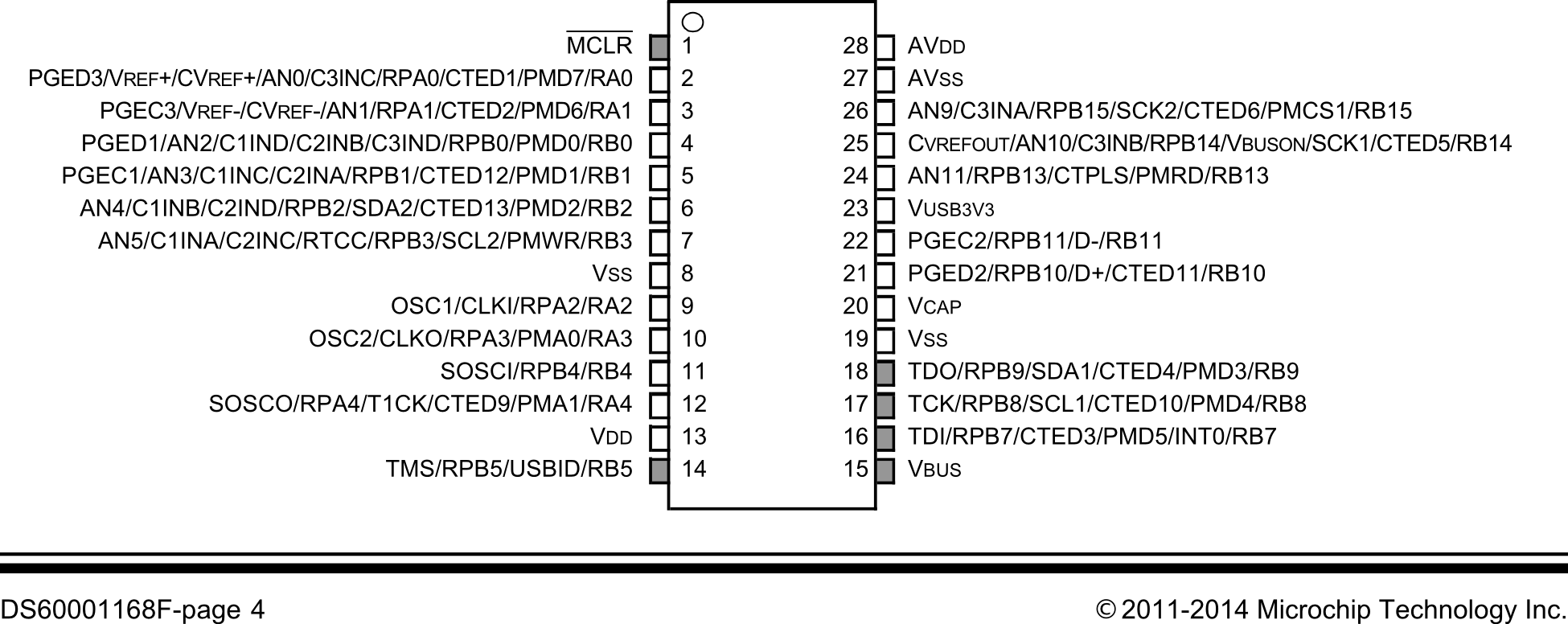
|

|

|
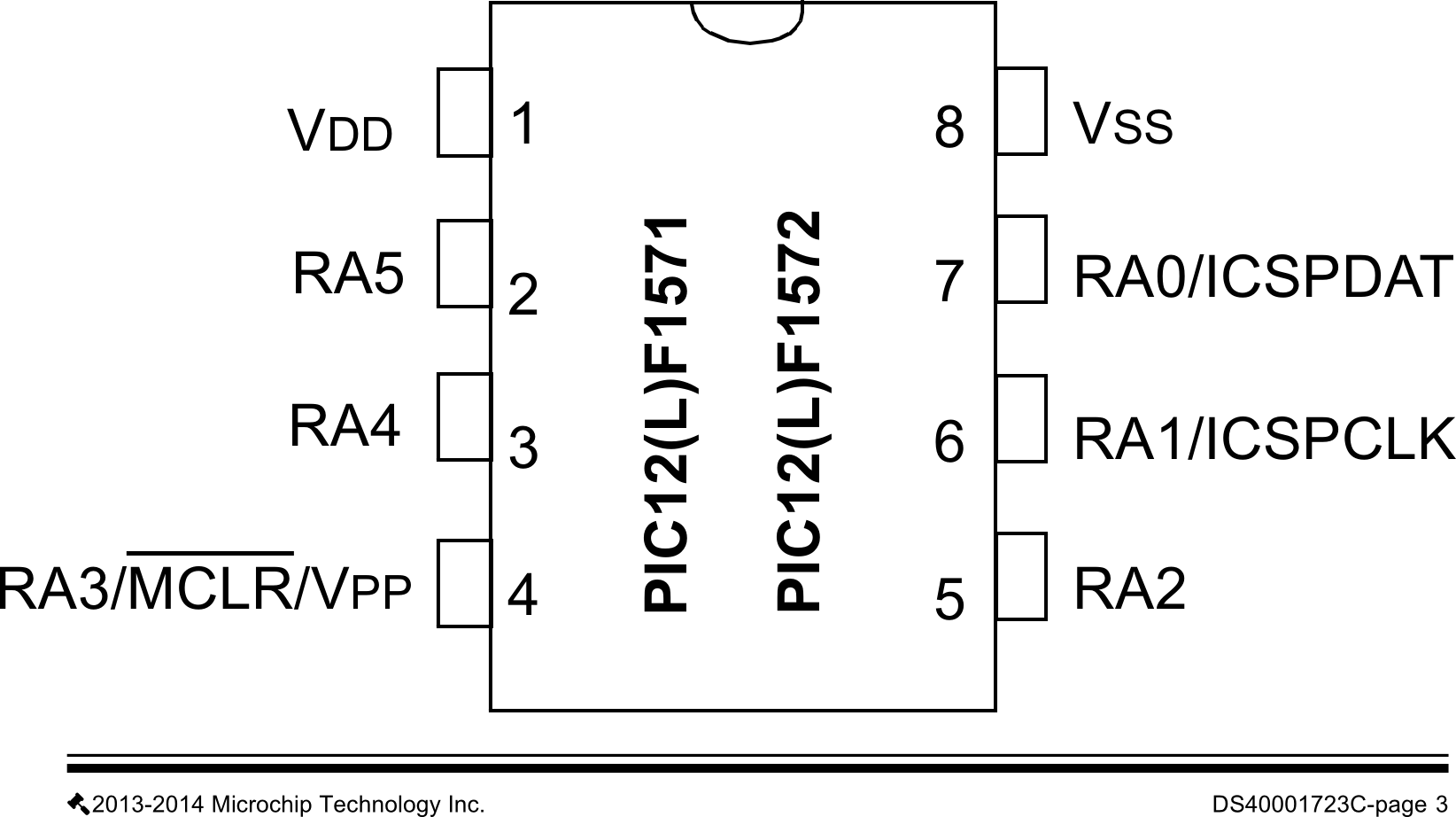
|

|
Addressing inside the chip
- PIC32MX1XX/2XX datasheet, pp. ?
| PIC32 | |
|---|---|
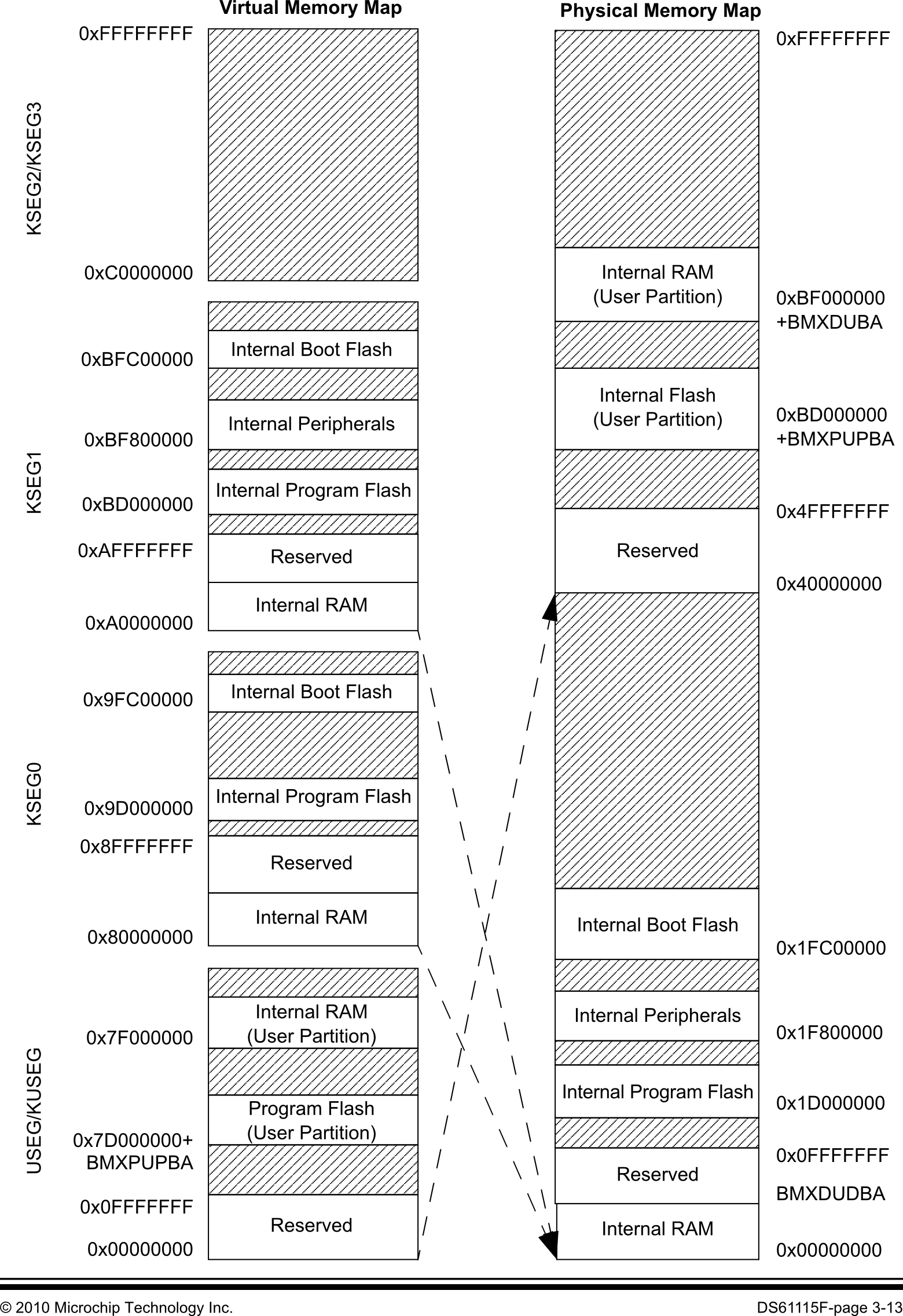
|
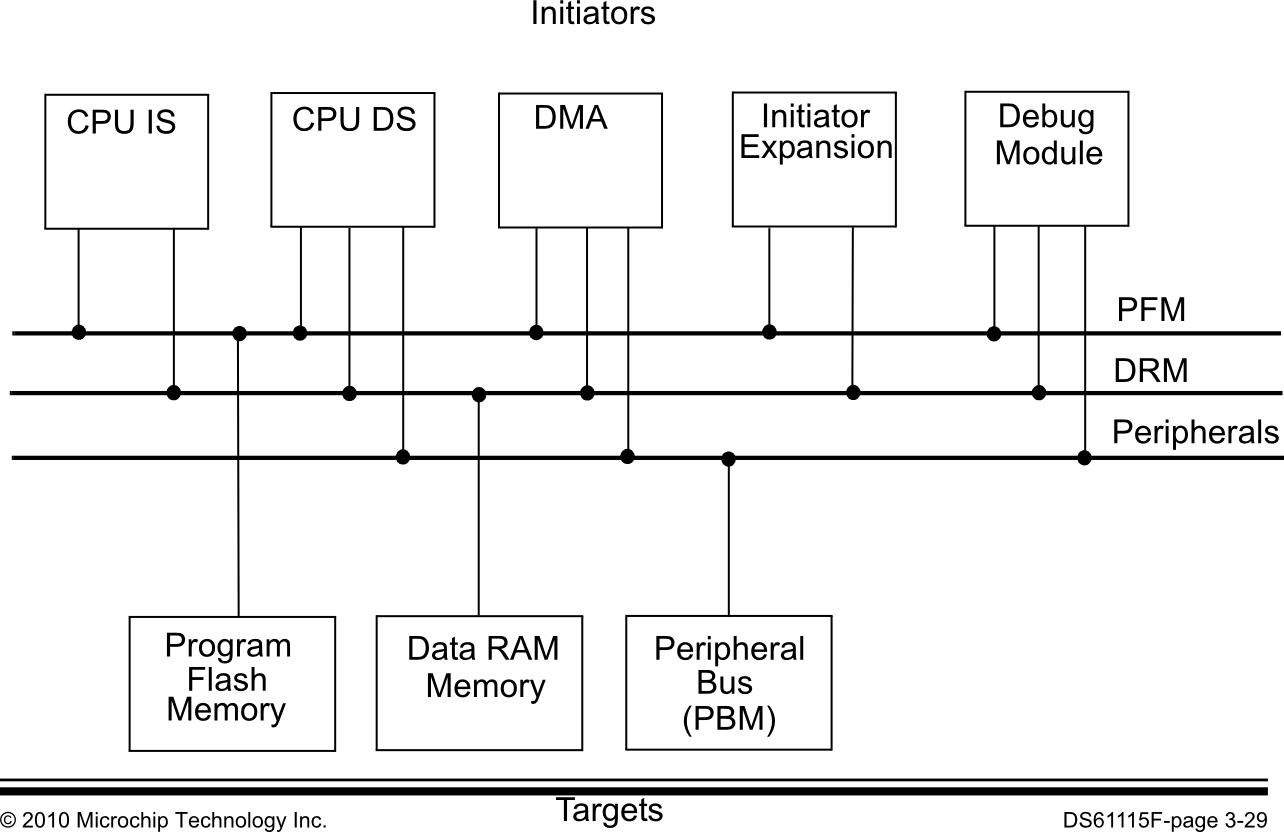
|
Configuration bits
- PIC32MX1XX/2XX datasheet, p. 59
Configuration bits are set with pragmas, an extension of C and C++, that allows including extra information. They are similar to Java annotations. Here are some examples of using pragma to set configuration bits.
#pragma JTAGEN=OFF #pragma FWDTEN=OFF #pragma FSOCEN=OFF
Determining which configurations to use can be difficult. There are several files which are installing with the compiler that can help out, such as the configuration setting pages for the PIC32 MX250F128B that we are using in class.
MPLAB X also provides a useful tool for configuring the bits. You can access it through menu with the selections Window ⇒ Pic Memory Views ⇒ Configuration Bits. Below you see the start, end, and code windows generated during the bit configuration process. You can then cut-and-paste the generated C code into your project.
| PIC32 | ||
|---|---|---|
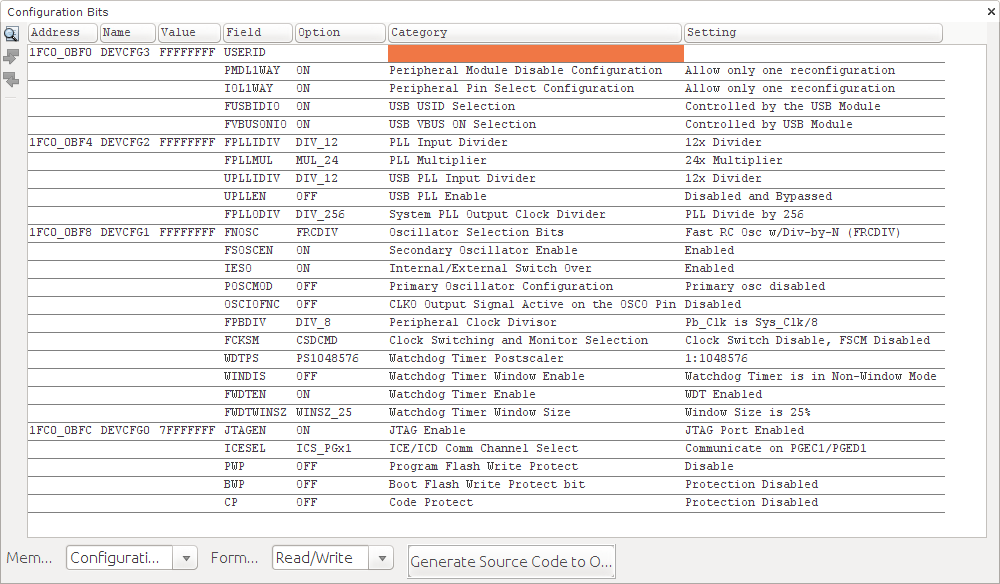
|

|
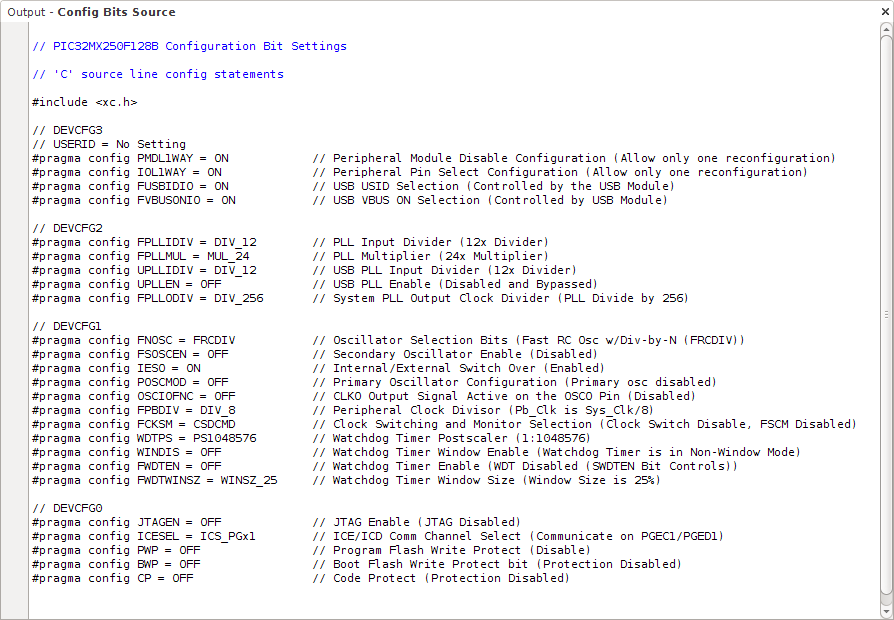
|
The clock!
- As the clock gets faster, more power is used
- ECE 3724 PIC24 Microcontroller Startup, pp. 15-16
- PIC32 Family Reference manual, Sect. 6 Oscillators, pp. 3, 5, 6,13-14
- Clock Generation spreedsheet
- pllfreq = infreq /
FPLLIDIV*PLLMULT/PLLODIV - Crystals & RC Oscillators
- 3 against 4 & Drumming 3 over 4
- Breadboard PIC32 with crystal — A pretty good tutorial from M5 at University of Massachusetts at Amherst ECE
| PIC32 | PIC12 | |
|---|---|---|
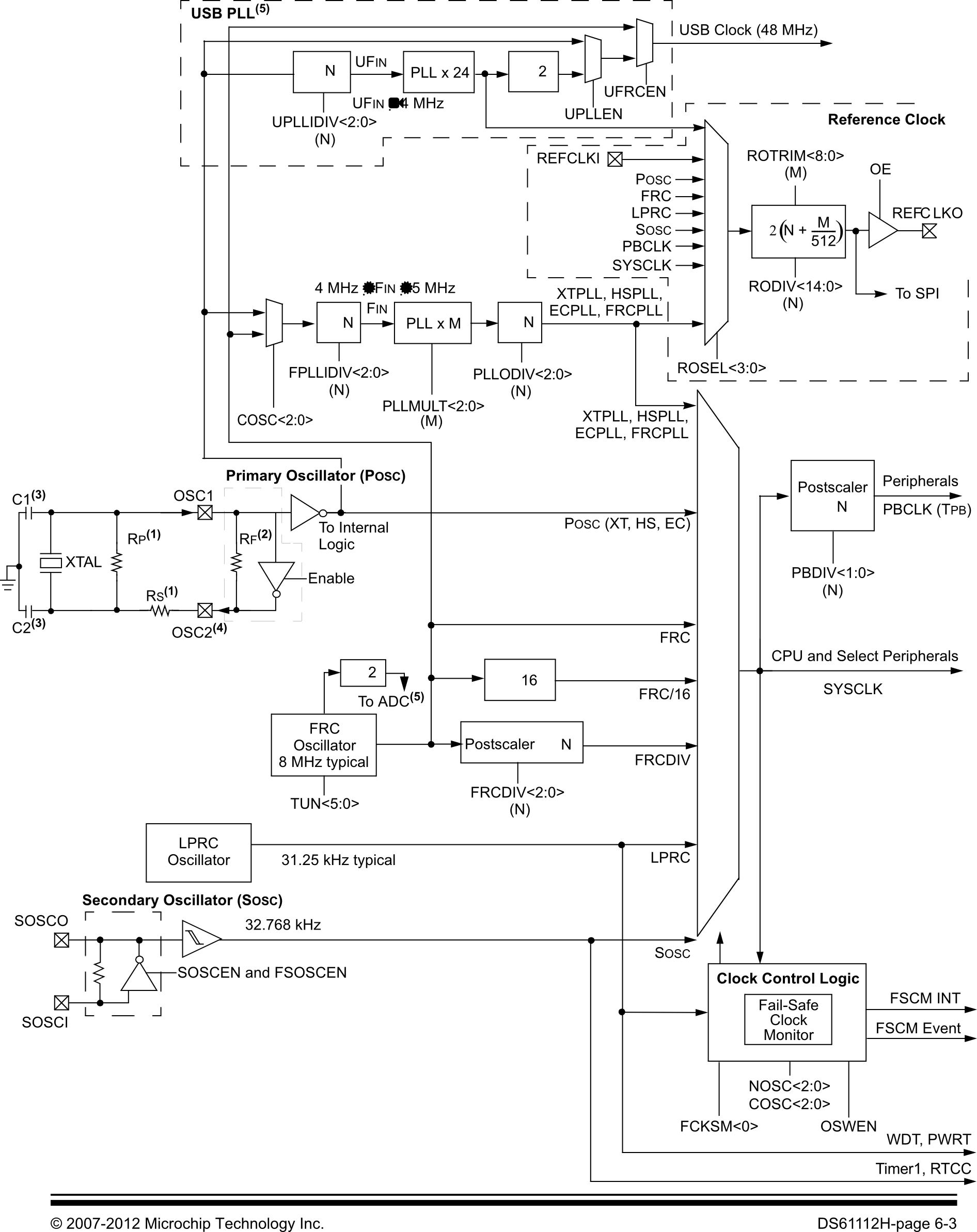
|
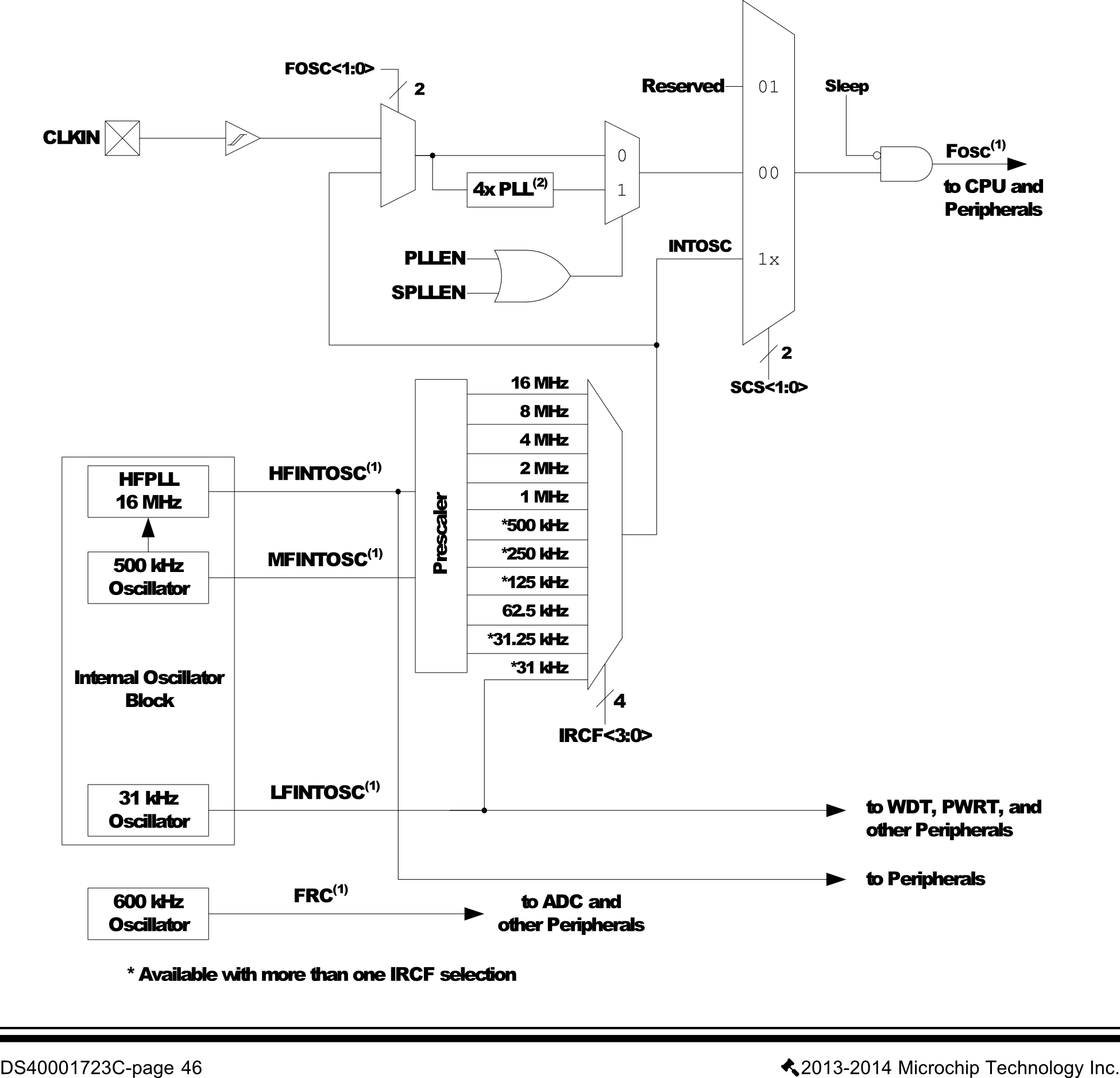
|
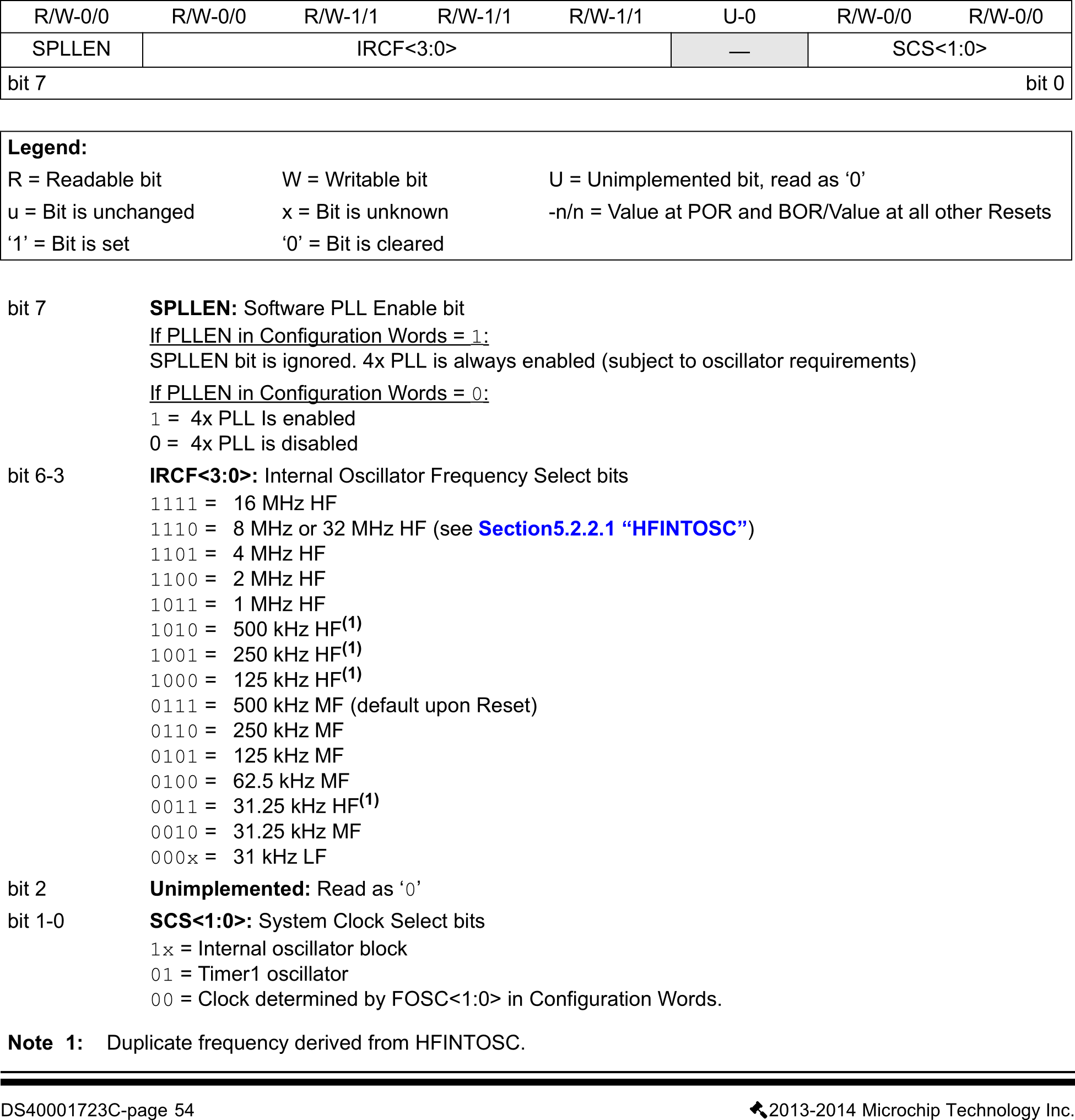
|
It is possible to change the clock rate after the chip is running. This is not easy on the PIC24.
#pragma config FNOSC=FRC // Fast RC Oscillator
#pragma config FCKSM=CSECMD // Clock switching enabled, FSCM disabled
inline void setupClock(void) {
PLLFBD = 41 ; // PLL Feedback Divisor
_PLLPOST = 0 ; // PLL postscaler
_PLLPRE = 0 ; // PLL prescaler
// Multiplying by (41+2)/((0+2)*2+(0+2)*2) or 10.75
// 10.75 * 7370000 = 79227500
// Writes 0x78 then 0x9A to unlock and then updates _NOSC
__builtin_write_OSCCONH(0b001) ;
// Writes 0x46 then 0x57 to unlock and then updates _OSWEN
__builtin_write_OSCCONL(0x1) ;
while(_COSC != 0b001) ; // waiting for clock switch
while(_LOCK != 0b1) ; // waiting for PLL to lock
}
It is much easier on the PIC12.
OSCCON = (OSCCON & ~_OSCCON_IRCF_MASK) | (0x0 << _OSCCON_IRCF_POSITION) ;
Reset and the watch dawg
- PIC24 Microcontroller Startup, pp. 25-26, 28-32
| PIC32 | PIC12 | ||
|---|---|---|---|
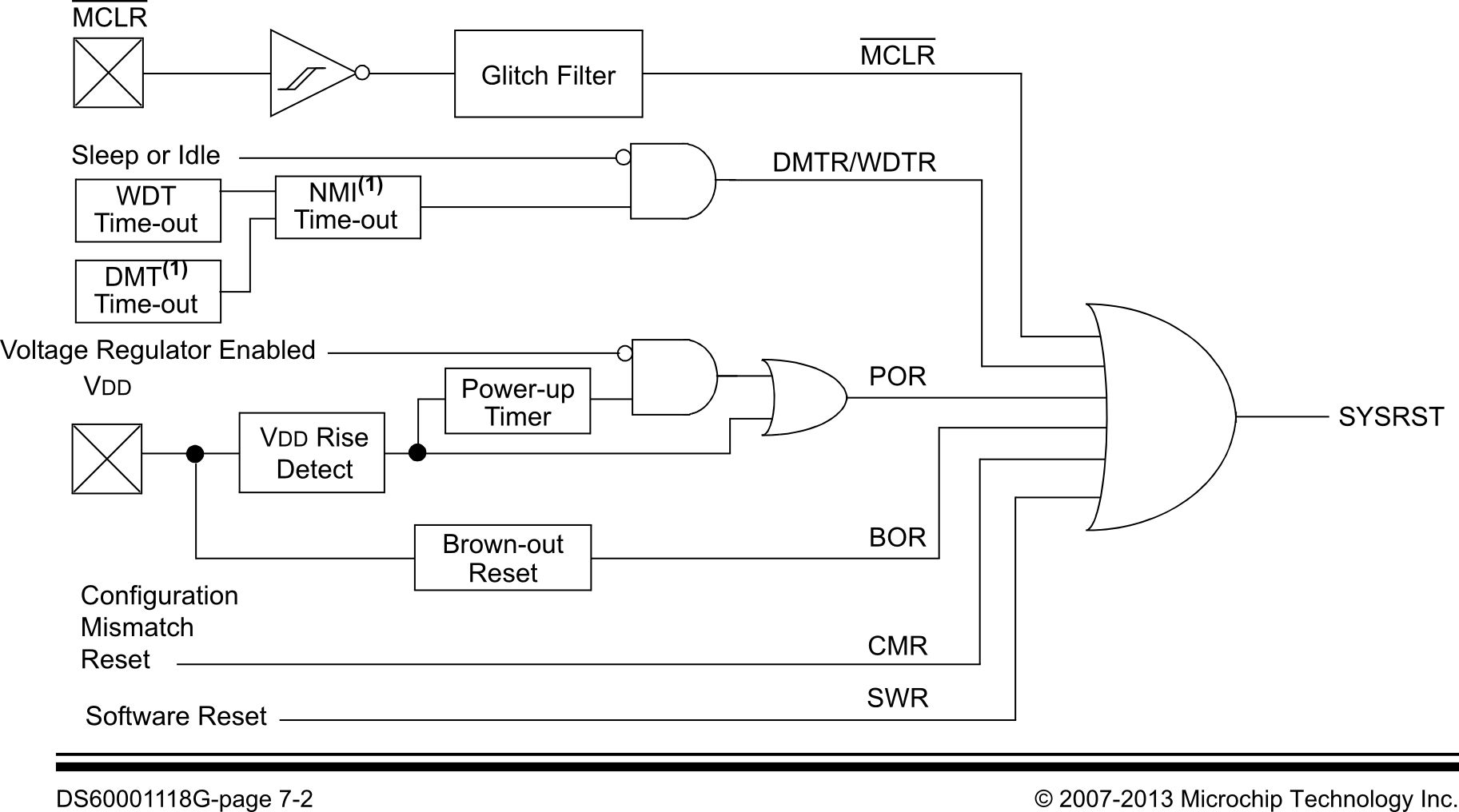
|
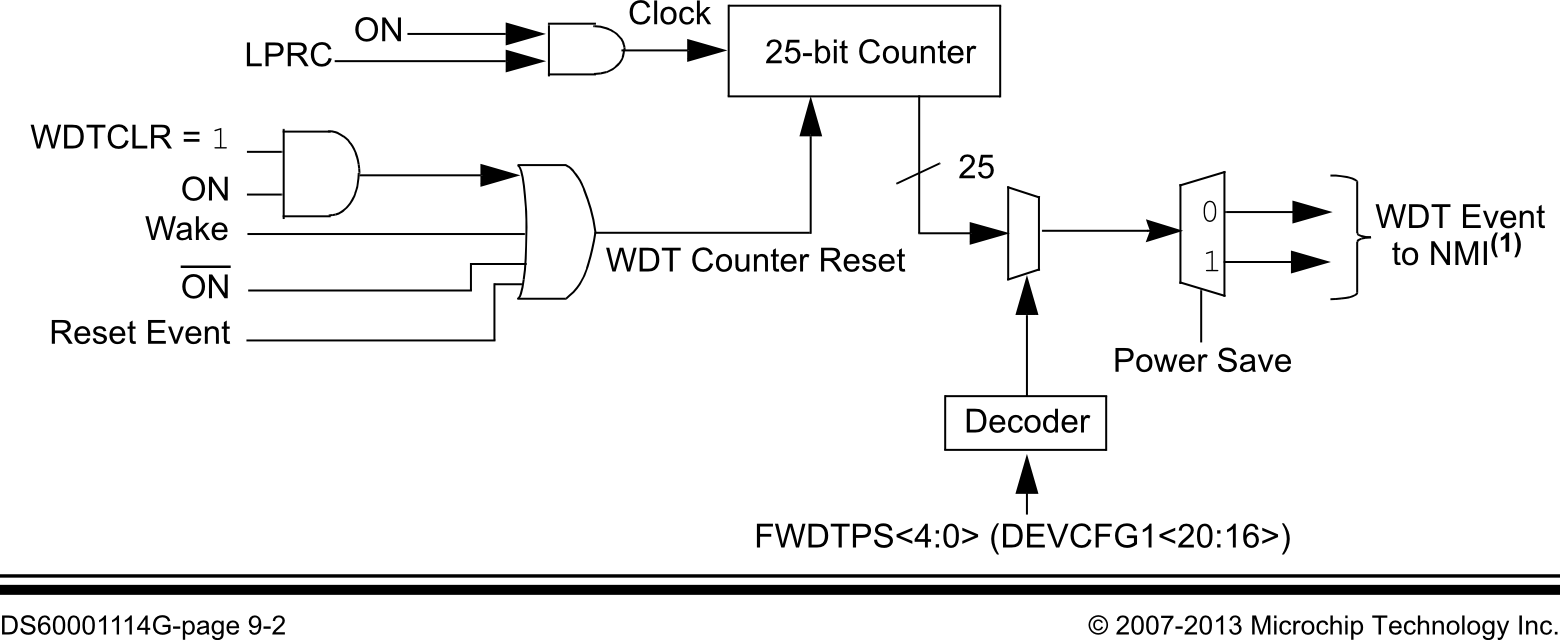
|
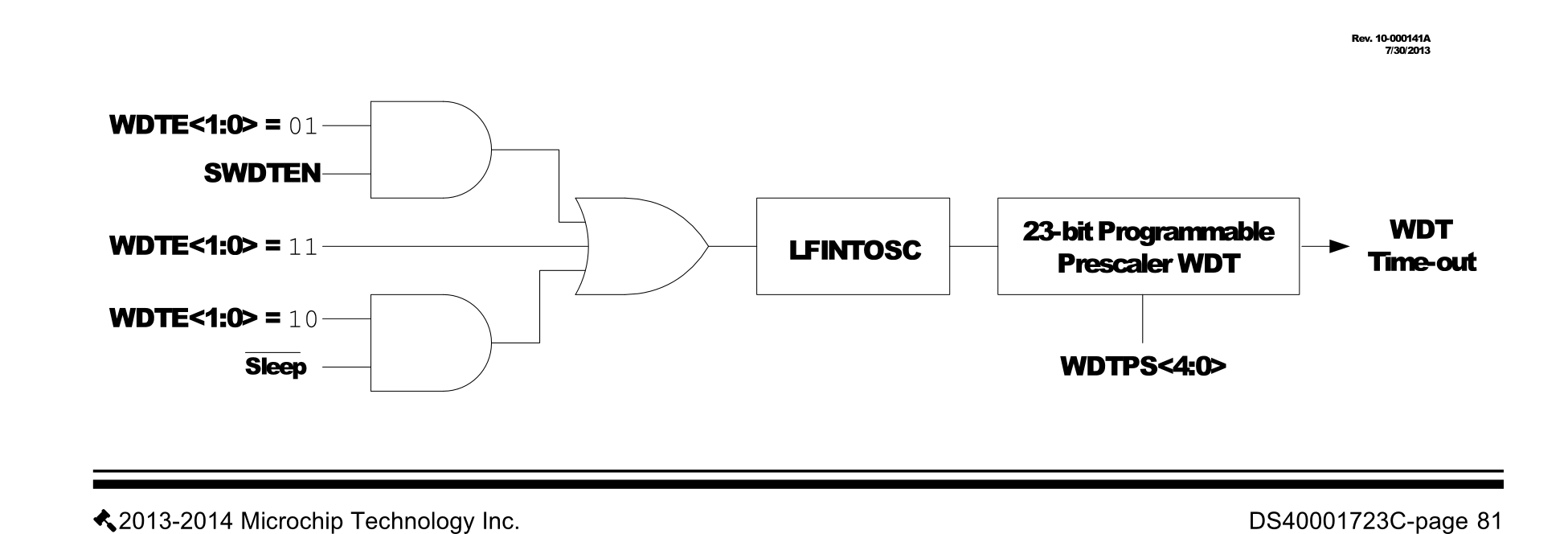
|
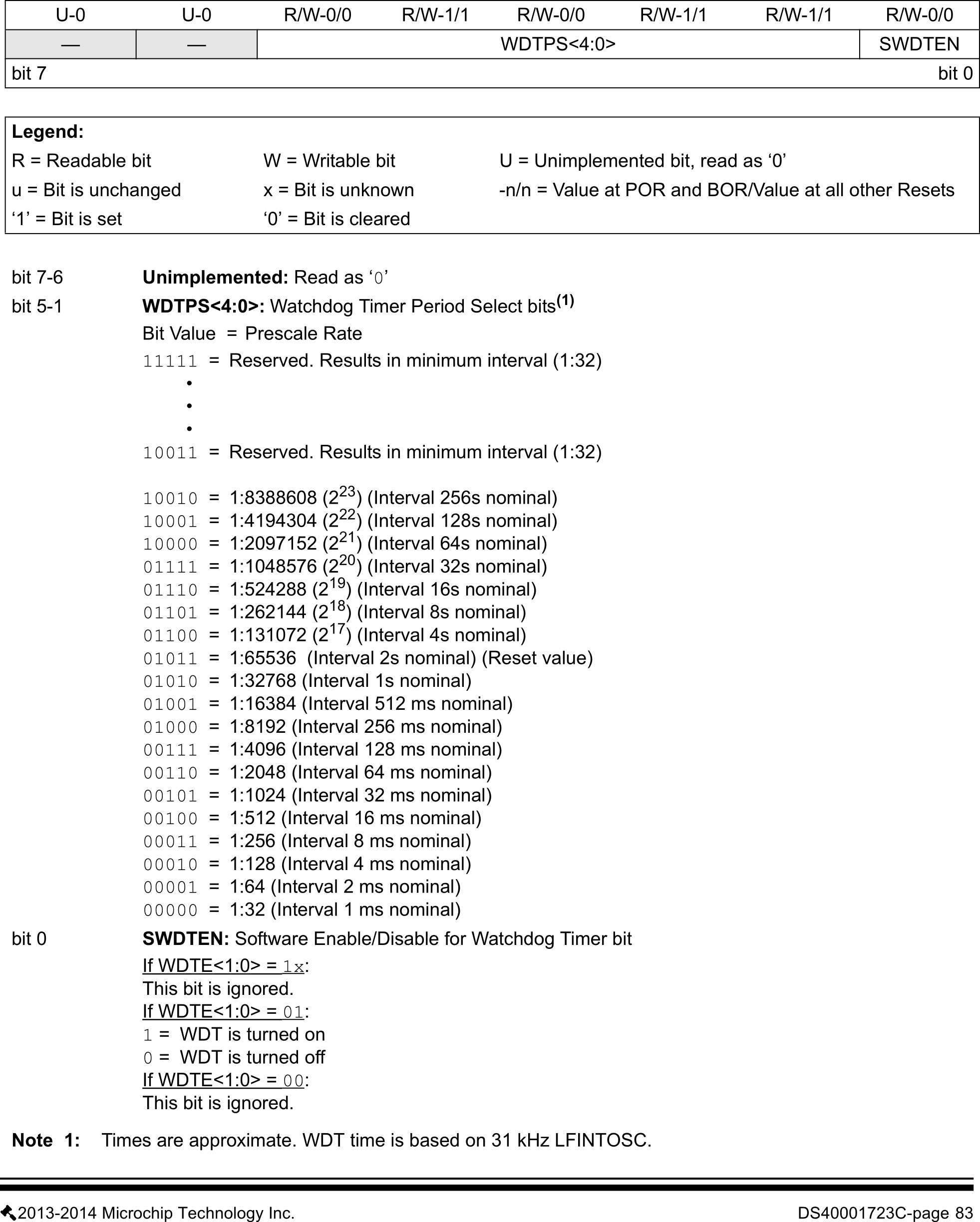
|
Here’s some code to sleep for eight seconds on the PIC12.
WDTCON |= _WDTCON_SWDTEN_MASK ; // Enable the dawg
WDTCON = (WDTCON & ~_WDTCON_WDTPS_MASK) | (0XD << 1) ; // 8 secs
asm(" SLEEP") ; // ZZZZZ
GPIO — General Purpose Input/Output
- PIC24 Parallel Port I/O, pp. 1-14
| PIC32 | PIC12 | |
|---|---|---|
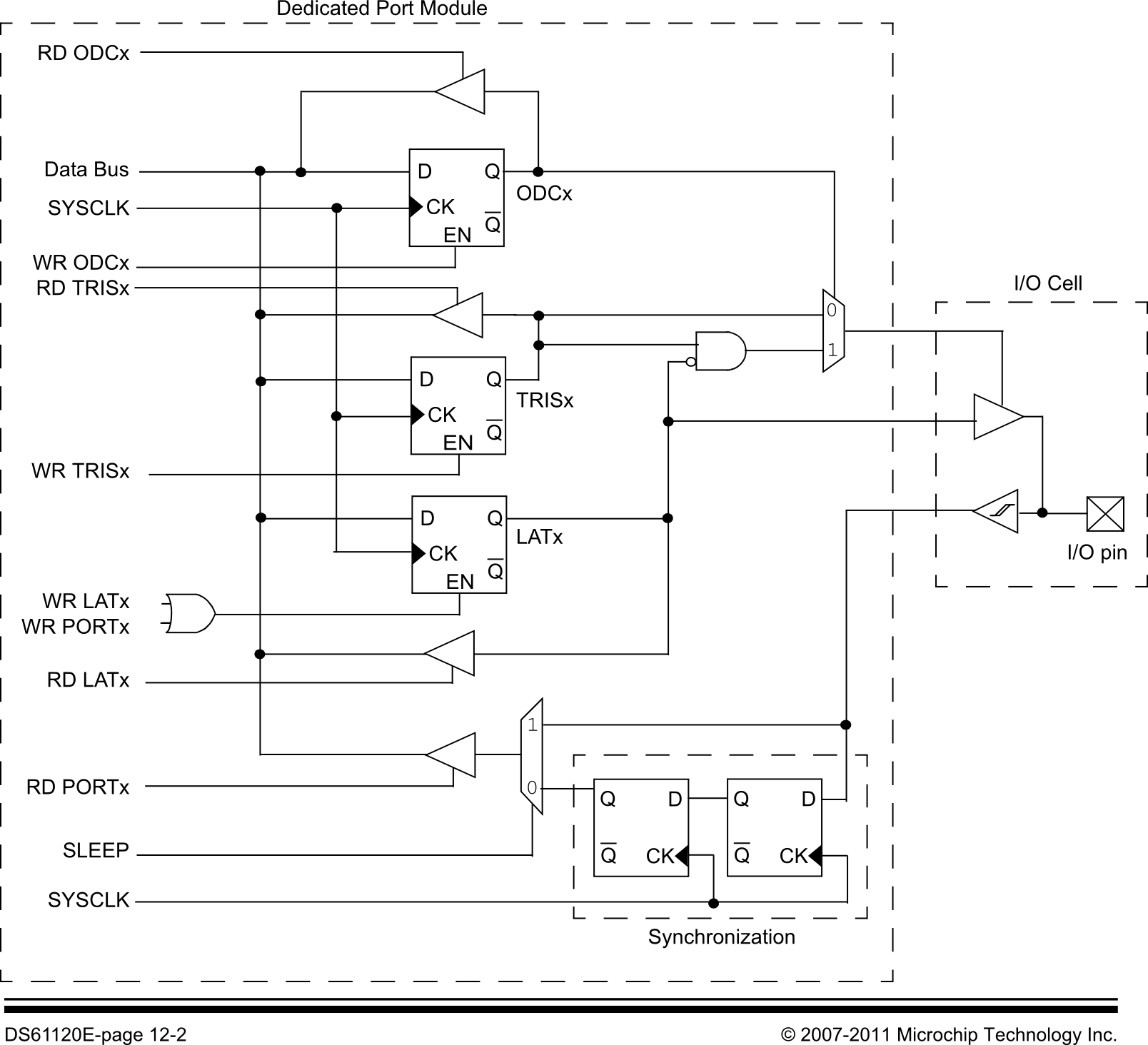
|
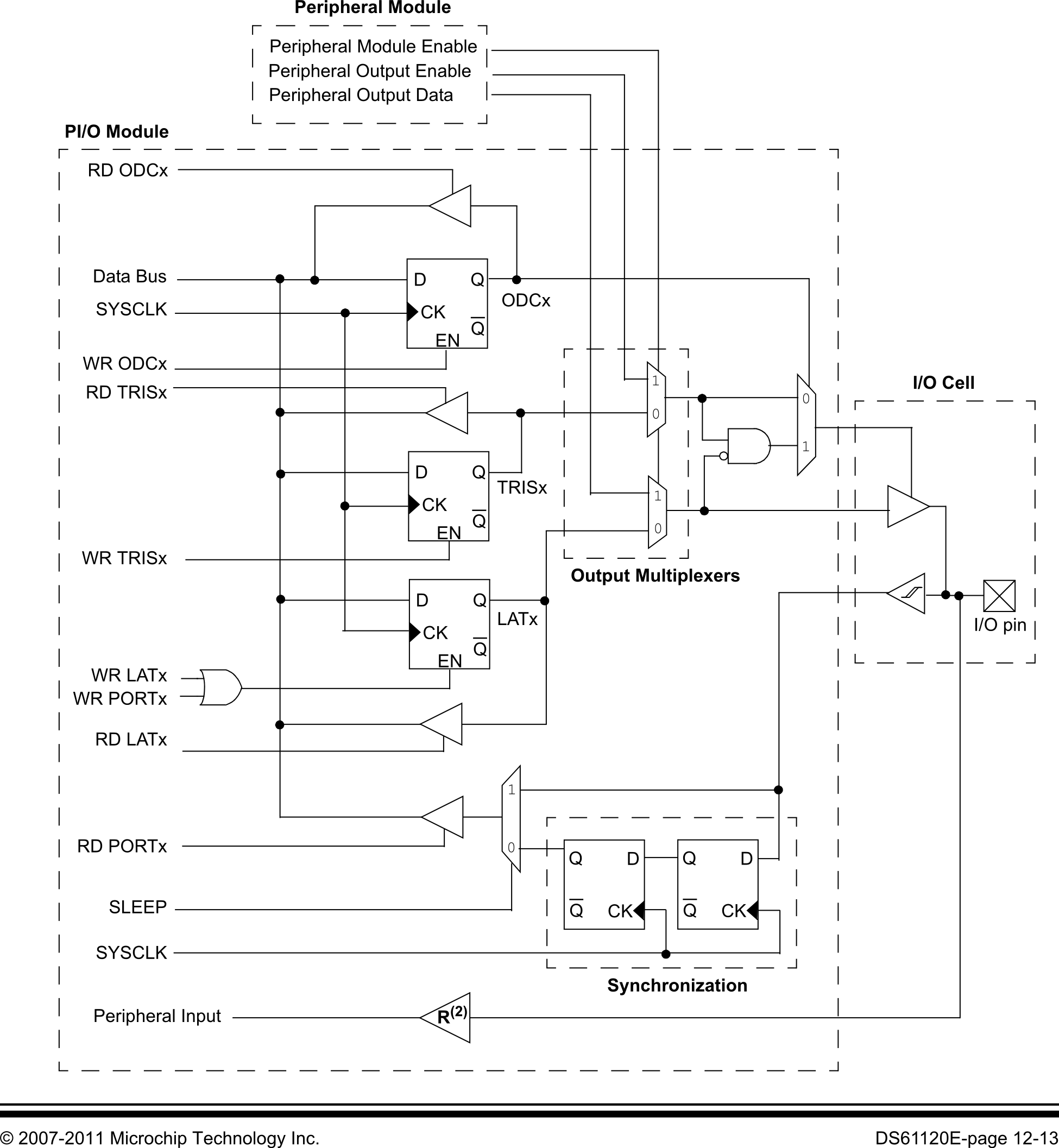
|
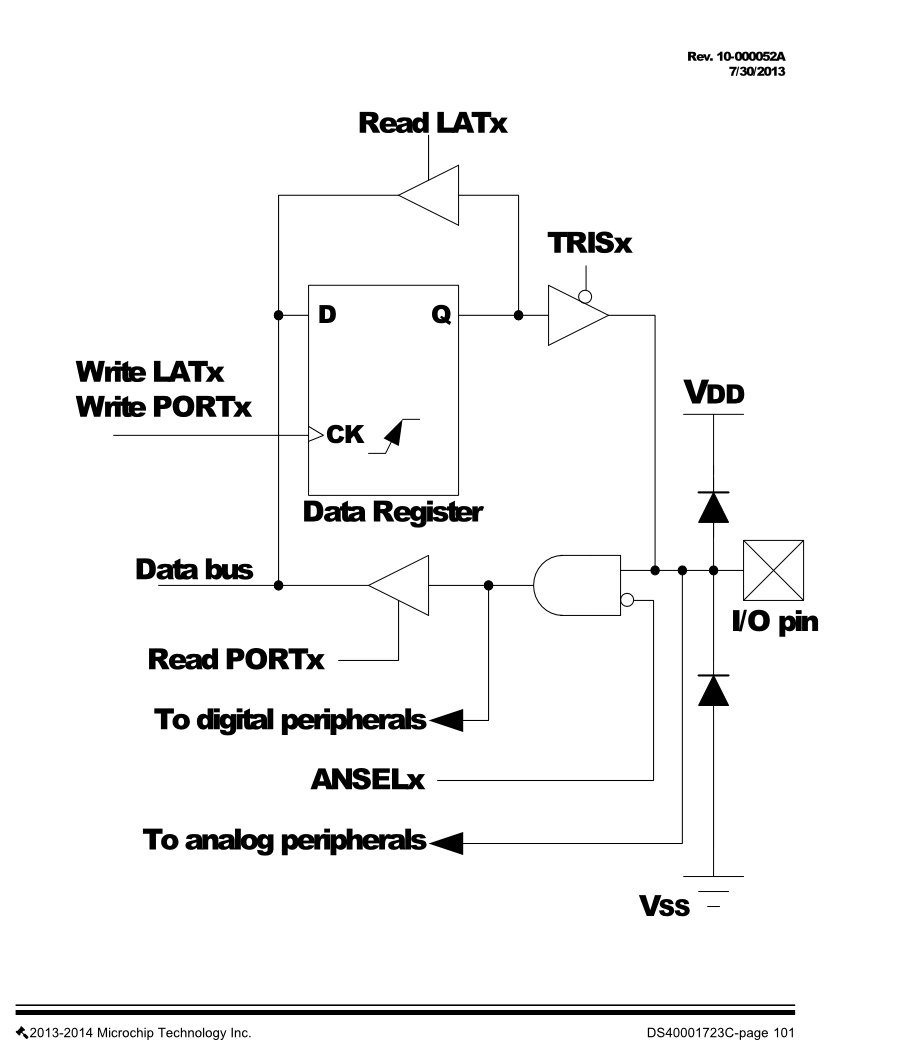
|
Here is the usual sequence for doing digital I/O.
- Read the manual and figure out if there is some configuration bit that has a special rule for that pin
- Use
ANSELxto choose digital - Use
TRISxto choose input or output - If input, use
CNPPUxto enable internal pullups - Use
LATxto write - Use
PORTxto read - If needed, use Google to figure out if there is some configuration bit that has a special rule for that pin